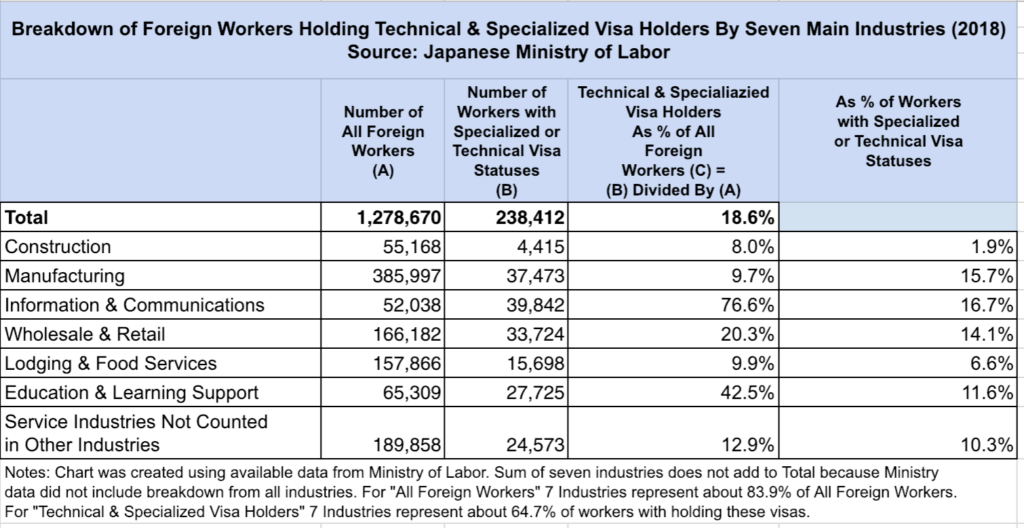Japan offers various types of work visas to foreigners who wish to work in the country, each catering to different professions and qualifications. The specific types of work visas can change over time, so it’s important to check the latest information with the Japanese embassy or consulate in your home country or on the official website of the Japanese Ministry of Foreign Affairs. Jobs In Japan 2024 For Foreigners- Full-Time & Part-Time
Types of Work Visa In Japan
- Engineer/Specialist in Humanities/International Services Visa (Engineer Visa):
- This visa is for individuals engaged in specialized work, including engineers, researchers, and professionals in the humanities and international services sectors.
- Requirements may include relevant qualifications or experience in the field.
- Instructor Visa:
- Individuals who plan to work as educators in Japan, such as language teachers, are typically issued an Instructor Visa.
- Many language instructors work in private language schools or as assistant language teachers in public schools through government-sponsored programs like the Japan Exchange and Teaching (JET) Program.
- Skilled Labor Visa (Skilled Worker Visa):
- This visa category is for individuals with specific skills and qualifications, including those working in construction, manufacturing, agriculture, and other skilled trades.
- Japan introduced the Technical Intern Training Program (TITP) for training foreign workers in certain industries, and participants may be granted a visa under this program.
- Entertainer Visa:
- Entertainers, artists, and performers who plan to work in Japan for cultural or artistic events are typically issued an Entertainer Visa.
- This visa category also includes professionals such as sports coaches and trainers.
- Business Manager Visa:
- Foreigners who plan to start or manage a business in Japan can apply for a Business Manager Visa.
- This category also includes those transferring to a Japanese branch of an international company.
- Investor/Business Owner Visa:
- This visa is for individuals who plan to invest a significant amount of capital in a Japanese business or start a business as an owner-manager.
- Specific investment thresholds and requirements apply.
- Journalist Visa:
- Journalists and foreign media personnel working for international media organizations in Japan are typically issued a Journalist Visa.
Types of Jobs in Japan
- Specialist and Skilled Labor: Japan actively welcomes foreign talent in various fields, especially if you possess specialized skills and knowledge. These jobs can range from IT professionals, engineers, researchers, and medical practitioners to language teachers, translators, and artisans.
- Teaching and Education: Teaching English is a popular choice among expatriates in Japan. Opportunities exist in both public schools and private language institutions. To teach in public schools, applicants often need to participate in government-sponsored programs like the Japan Exchange and Teaching (JET) Program.
- Hospitality and Tourism: Japan’s booming tourism industry has created a demand for workers in the hospitality sector. This includes jobs in hotels, restaurants, travel agencies, and event management.
- Manufacturing and Engineering: Japan is renowned for its precision and innovation, making it a hub for engineering and manufacturing jobs, particularly in the automotive and electronics sectors.
- Business and Finance: Tokyo, the capital of Japan, is a global financial center. Opportunities in banking, finance, and international business abound, especially for those with relevant qualifications and language skills. Jobs In Japan 2024 For Foreigners- Full-Time & Part-Time
Eligibility Criteria And Fees
The fees are subject to change, and it’s essential to check with the nearest Japanese embassy or consulate or visit the official website of the Japanese Ministry of Foreign Affairs for the most up-to-date information. Below is a general overview of the fees associated with a Japan work permit: Jobs In Japan 2024 For Foreigners- Full-Time & Part-Time
- Certificate of Eligibility (COE) Fee: Before applying for a work visa, your prospective employer in Japan typically needs to obtain a Certificate of Eligibility (COE) from the Japanese Immigration Bureau. The COE fee varies depending on the type of visa and the length of stay but can range from ¥3,000 to ¥6,000 or more.
- Visa Application Fee: The visa application fee itself may vary based on your nationality and the type of visa you are applying for. As of my last update, the fees for some common work-related visas were as follows:
- Single Entry Visa: ¥3,000
- Multiple Entry Visa: ¥6,000
- Transit Visa: ¥700
- Visa for Cultural Activities: ¥3,000
- Visa for Technical Intern Training: ¥3,000
- Visa for Skilled Labor (Engineer, Specialist in Humanities/International Services): ¥3,000
- Visa Extension/Renewal Fee: If you plan to extend or renew your work visa while in Japan, there may be additional fees. These fees can also vary depending on the visa type and your circumstances.
- Residence Card Fee: Once you arrive in Japan, you will be issued a Residence Card, which serves as your identification card in the country. There is typically no separate fee for the initial Residence Card. However, if you lose your card or need a replacement, there may be fees associated with obtaining a new one.
Application Process For Work In Japan
1. Secure a Job Offer:
- Before applying for a work visa, you need a job offer from a Japanese employer. Your prospective employer will play a significant role in the application process.
2. Obtain a Certificate of Eligibility (COE):
- Your prospective employer in Japan must apply for a Certificate of Eligibility (COE) on your behalf from the Japanese Immigration Bureau. The COE serves as a prerequisite for your visa application.
- The required documents for the COE application may include your passport copy, an employment contract, and a letter of guarantee from your employer. The specific requirements can vary based on the type of work visa.
3. Visa Application:
- Once the COE is approved, you can apply for your work visa at the nearest Japanese embassy or consulate in your home country. It’s advisable to make an appointment in advance if required.
- Submit the following documents along with your visa application form (which can usually be downloaded from the embassy’s website):
- Valid passport.
- One or more passport-sized photos.
- The original COE.
- A completed visa application form.
- Proof of your financial stability (bank statements or a letter of guarantee).
- Any additional documents required for your specific visa type (e.g., proof of qualifications for skilled worker visas).
- Pay the visa application fee, which can vary based on your nationality and the type of visa you are applying for.
4. Attend an Interview or Biometrics Appointment (if required):
- Some applicants may be required to attend an interview or provide biometric data, such as fingerprints and a photograph.
5. Wait for Visa Processing:
- The processing time for a Japanese work visa can vary by nationality and visa type but generally takes several weeks. Be sure to apply well in advance of your intended departure date.


